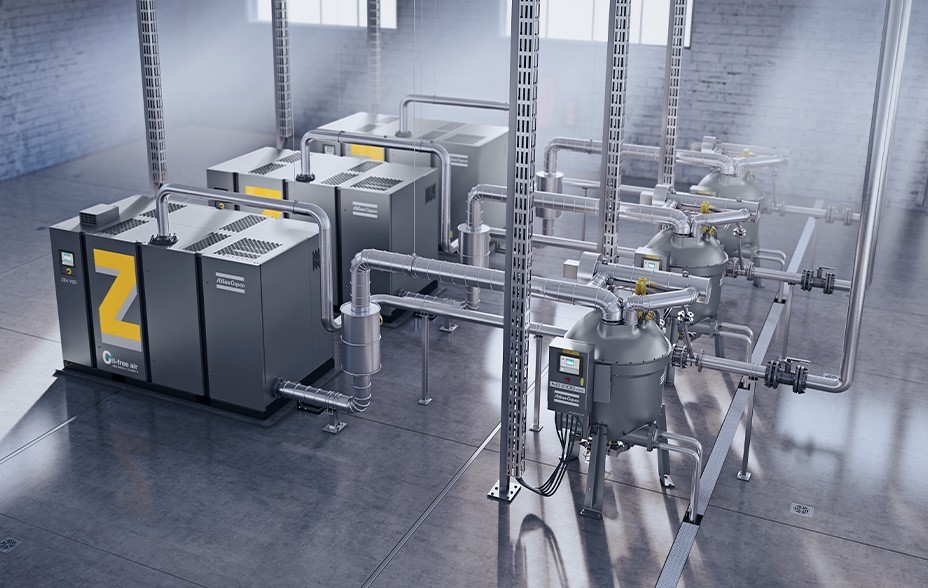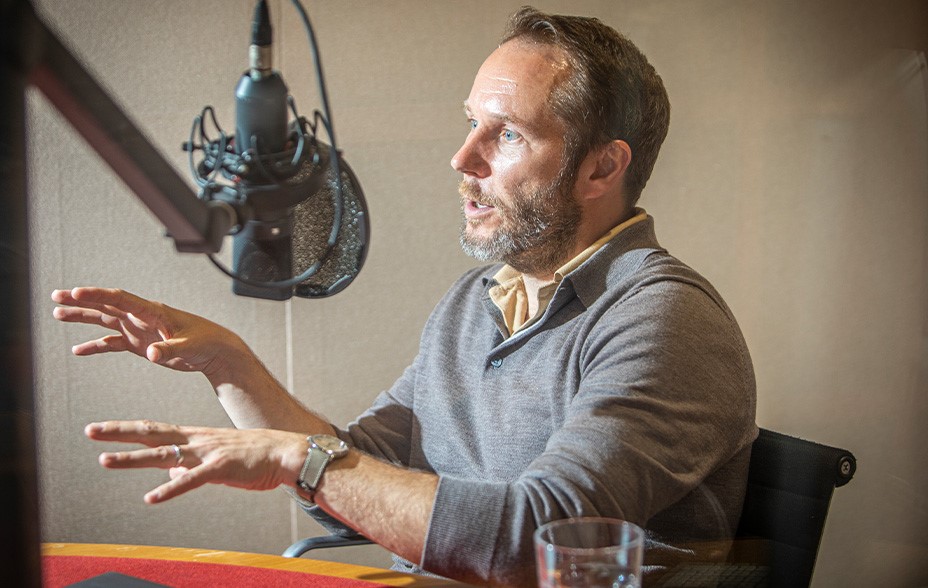Key Points
- A small country of 10 million people, Sweden is big on commercialising innovations, from the zip to Tetra Pak packaging
- Family-run businesses and founder-run companies have formed clusters of world-beating innovation
- Green technologies, developed and nurtured in Sweden, are catching on across the globe

All investment strategies have the potential for profit and loss, your or your clients’ capital may be at risk. Past performance is not a guide to future returns.
There’s a Swedish saying: ‘If you look at Sweden from space, you can see two things, social democracy and the Wallenbergs.’ Such is the significance of one of Europe’s most powerful business dynasties.
The Wallenbergs are the controlling shareholders of Atlas Copco, a global leader in compressors, pumps and power tools, whose roots date back to 1873. One of Baillie Gifford’s longest-held stocks, it’s typical of a Swedish speciality: companies that can generate extreme returns over long periods.
Such companies, both old and young, exemplify the kinds of Swedish stocks rated by Stephen Paice, joint manager of the Baillie Gifford European Growth Trust and the European Fund. Paice doesn’t specifically target Swedish companies. They make it into his portfolios, he says, as a natural result of his search for companies that can become ‘outliers’.
“These are the companies that could go on to produce huge upside for our clients by generating extreme returns over long periods.”
Paice’s goal then is “to try and find those outliers and hold them forever.”
Why then does the country produce more than its fair share? Paice points to a Swedish cultural strength: The country ranks at the top or near the top of global innovation and competitiveness indices.
The zip, monkey wrench, the three-point seatbelt, the pacemaker: The Swedes can claim to have commercialised them all. Tetra Pak, whose cartons are widely used in food and drink packaging exemplifies Swedish companies’ ability to turn inspiration and practical problem-solving into massively lucrative businesses.
Paice highlights the factors that make the country so good at commercialising its bright ideas:
- High levels of secondary and tertiary education
- Good funding for start-ups
- Collaboration between businesses and academia
- Lots of patent applications are filed and scientific papers published
- And high levels of taxation that feed into a broad and generous welfare system

You get that sense of history and the legacy.
It’s a family affair
But Paice highlights another factor aiding the long-termism conducive to strong future returns. And that’s businesses still led by their founders, or by the next generations of the same founding family.
Atlas Copco is a prime example. For Paice, it stands out as “one of the best, if not the best engineering companies in the world.” The Wallenberg family has overseen its entire history. Having founded Stockholm’s Enskilda Bank in 1856, André Oscar Wallenberg was one of the company’s four founders and largest initial shareholder.
“For 20 years, Atlas Copco has been supplementing sales growth with acquisitions of other businesses.”
He says, “through fantastic service and aftermarket support for its customers, it’s been able to improve its profitability.”
But it’s the culture within the business that Paice values most, “it’s not just about innovation, it is honed and focused on decentralisation.”
In other words, each sub-business under the Atlas Copco umbrella is empowered to make decisions on its profit and loss accounts.
“It has this long-term mentality, where the focus is on providing services to customers and looking after employees. It’s not the usual Anglo-Saxon mentality of mainly looking after the shareholder.”
The last time Paice visited Atlas Copco, it was to meet managers at Investor, the Wallenberg’s holding company. Portraits of all five generations of the family hung on the wall.
“You get that sense of history and the legacy,” he says. “The family is there to protect and maintain these businesses. It wants to pass them onto the next generation in a better shape than they inherited them.”
This mentality lends itself to longer-term and more valuable decision-making. When asked, Jacob Wallenberg, the former vice-chairman says, “long-term investing is 50 years and beyond.”
Other Swedish companies that benefit from family ownership include Hexagon, Sandvik, Volvo, Handelsbanken and Assa Abloy, Paice notes. “Each of these companies has a family member on the board. This means they have a long-term owner who influences capital allocation decisions.”

With all the innovation we’re witnessing, the future for Swedish companies is bright.
Clusters of innovation
But Paice has noticed a change: “We’re starting to see this generational shift. Multigenerational families are being joined by first-generation founder-run businesses, such as Spotify.”
These companies feed off Sweden’s culture of innovation that’s supportive of start-ups.
“Role models such as Daniel Ek, founder of Spotify, have given start-ups a role model and the ambition to see what they could achieve.”
Public policy helps. In the 1990s, the government offered Swedish residents a tax break to buy personal computers with the aim to put a PC in every home.
“This helped the Swedes become early adopters of technology. Then a few years later, Stockholm built the largest open fibre network. And 100 per cent of businesses and most homes tapped into that. That has been a massive benefit for these companies.”
Stockholm in particular has become known as a ‘unicorn factory’ – a unicorn being a privately held startup company valued at over $1bn – thanks to:
- A collaborative culture,
- The long-term mindset of founders,
- The support available to entrepreneurs and
- A workforce empowered to innovate
At one point, Paice notes, the capital was producing more billion-dollar companies per capita than any other region in the world.
“You might not have heard of some of those companies, such as King and Mojang. But if I say they were responsible for Candy Crush and Minecraft, you might recognise them.”
Southern Sweden’s Medicon Valley is the country’s answer to Silicon Valley, mainly housing life sciences companies. There are also technology and gaming clusters, for instance, in Stockholm’s Södermalm district.
Citing fintech companies Klarna and iZettle and music streamer Spotify, Paice is convinced that: “With all the innovation we’re witnessing, the future for Swedish companies is bright.”
Decarbonising technologies
Many of the green technologies and behaviours that started in Sweden are now spreading across the world. Sweden is a global leader in decarbonisation. As well as being one of the first to proclaim its net-zero ambition – targeting net-zero by 2045 – it intends to cut emissions by almost 60 per cent by 2030.
Paice thinks Northvolt exemplifies this next generation of European companies, “It’s a platform for manufacturing green and sustainable batteries. Although only founded in 2016, it will likely be Sweden’s most valuable company soon.”
Being Swedish matters. The country generates most of its power by hydroelectricity. “Northvolt is using that hydroelectric power to lower the cost of producing these batteries, but it’s also put their sustainability at the top of its priority list.”
Capturing the long term
Paice hopes that this “European champion in the making will, by the end of the decade, capture a huge portion of the quickly growing market for electric batteries, but also, energy storage and a range of other industrial applications.”
He’s excited about the long-term opportunity arising for the company and its shareholders, “Northvolt is in a fantastic place to provide Europe with sustainable batteries. It has the right people involved and the long-term mindset to see this business grow. Hopefully, Baillie Gifford can be shareholders for 37 years, as we have been with Atlas Copco.”
Words by Gillian Christie.
Want to find out more about the Swedish advantage? Listen to the podcast at bailliegifford.com/podcasts
Important information
As with any investment, capital is at risk.
This communication was produced and approved in July 2022 and has not been updated subsequently. It represents views held at the time of writing and may not reflect current thinking.
This article does not constitute, and is not subject to the protections afforded to, independent research. Baillie Gifford and its staff may have dealt in the investments concerned. The views expressed are not statements of fact and should not be considered as advice or a recommendation to buy, sell or hold a particular investment.
Baillie Gifford & Co and Baillie Gifford & Co Limited are authorised and regulated by the Financial Conduct Authority (FCA).
Ref 23415 10012159

